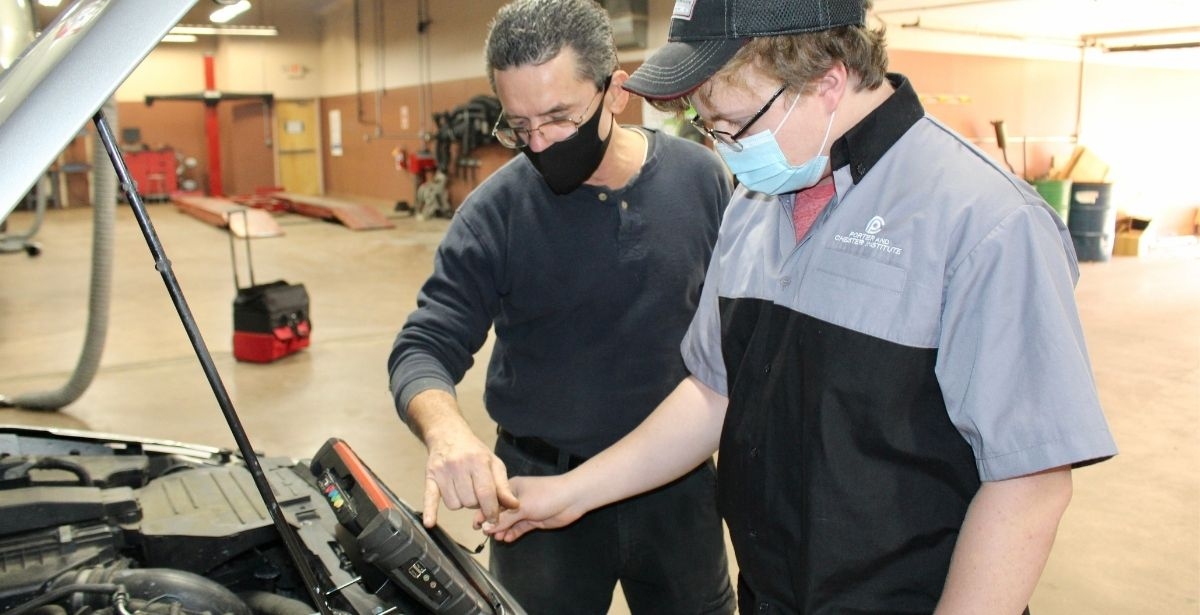
What’s the Best Way to Learn About Car Computers?
Vehicles are very advanced machines. Some would say they’re computers on wheels. And it’s true! Every car manufactured today has at least one computer system in it, but most have many more. Once upon a time, you could learn a lot about cars with a curious mind, a good manual, and lots of free time to putter. But now, if you want to work on cars, you need to learn about computers. That means you’ll want a good Automotive Technology program, taught by ASE Certified Master Technicians who know the field as well as they know modern cars and the computers that run them.
How to Learn About Car Computers
You don’t need to earn a degree in computer science to learn about car computers. There are other ways to gain this knowledge such as:
- Hands-On Training—The best way to learn about car computers is to enroll in an automotive technology training program. You’ll learn from professionals who know their way around engines—and computers—and prepare yourself for a new career.
- Automotive Technicians—As you hone your skills on campus, don’t forget there are professionals out there already working on car computers. The next time you stop by the auto shop or your car dealership, talk to an auto mechanic. It’s a great way to learn a little more and, at the same time, expand your network.
- Car Manuals—Check out your car manual. What systems on your own car run by computer? You might be surprised!
What Does a Car Computer Control?
Your car’s computer system is known as CAN, the Controller Area Network. It’s made up of several smaller computers called Electronic Control Units. The ECUs control different areas of the car such as the transmission, the brake system, and the engine. The sensors in each computer can detect things like temperature, air pressure, steering angles, and engine emissions. The data from these sensors move throughout the CAN network and are sent to the rest of the ECUs as a means of communication. You may not have realized that your car has a system of computers that “talk” to each other, but you would recognize the results of that communication. Here are a few examples of what CAN does:
- Operates automatic transmission, your engine, and emissions
- Controls the fuel injector and spark plugs
- Unlock your car doors or enable your security system
- Deploy air bags when necessary
- Turns your “check engine” light on
Problems with Car Computers
Like any other part, a car’s computer can experience issues. Electrical shorts to the power supply could damage or destroy it. The vehicle’s conditions can also harm it. Unlike the computer in your home, your car’s computer is exposed to the elements. The combination of excessive heat and moisture can lead to corrosion. The vibration and electrical surges from the battery or starter can also cause problems with the computer. Needless to say, a damaged computer can lead to a malfunctioning car. How will you know when the computer needs to be looked at?
- The “Check Engine” Light—If the light toggles on and off randomly and there doesn’t seem to be any issue with the engine, it’s a good indication that the car computer is on the fritz.
- The Car Won’t Start—If it takes a wing and a prayer to start your car, the problem may not be just the engine. It could be that the computer isn’t communicating with it.
- Your Gas Mileage Tanks—Can’t drive as far as you used to on a full tank? It could indicate an issue with the computer sensor, but only if you notice the fuel economy has dropped over a short period of time.
How to Troubleshoot Car Computers
When your car computer has issues, you can take it to the dealership to be replaced. You can also take it to a mechanic who can run onboard diagnostic tests to troubleshoot the issue. But if you have a passion for cars—and computers—and you want to learn how to fix the problem yourself, contact Porter and Chester Institute today. We offer Automotive Technology training in Connecticut that can put you on the path toward a new career in as few as 12 months. Fill out the form to request more information.






